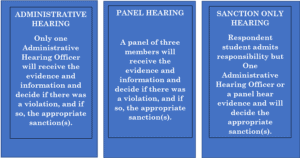You’ve worked hard. You’ve studied and nailed the final exams. A college degree, and the bright future it brings, are within your grasp. That is, until the university calls about a Student Code of Conduct investigation or a Title IX complaint. Now, you are faced with the possibility of a mark on your official record, suspension or even expulsion from the university.
Campus Rule Book?
Believe it or not, when you enrolled in college, you agreed to abide by a specific code of conduct, which applies to your behavior both on and off campus. This Student Code of Conduct is the rule book for the university and explains the university’s expected standards of behavior. It also details the procedures and process in place to deal with student misconduct. You can find Texas Tech University’s Code of Student Conduct here.
Common Student Offenses
Some common offenses students may find themselves having to defend themselves against include, but are not limited to:
- Driving While Intoxicated/Driving Under the Influence
- Possession of Marijuana or Paraphernalia
- Minor in Possession/ Minor in Consumption
- Public Intoxication
- Possession of Controlled Substances (can include non-prescribed possession of Adderall or Ritalin
- Allegations of sexual assault, harassment or stalking
Process of an Alleged Violation
The investigative process begins with a complaint to the Office of Student Conduct or Office for Student Civil Rights & Sexual Misconduct. They will make an initial decision on whether or not they will proceed with an investigation. If an investigation is begun, the school will provide the student a letter, typically through his or her Texas Tech email account. The person who makes the complaint is the Complainant. The student accused is the Respondent.
The Office of Student Conduct can impose “interim actions” against the Respondent student before there is a formal investigation or resolution to the complaint. These interim actions can include changes in the Respondent student’s on-campus housing, parking permissions, changes to their class schedule, a no-contact order and even suspension.
The Respondent student will be asked to meet with an Investigator from the University. The Respondent student has the right to have an advisor attorney present at any meetings or Hearings. The Respondent student can elect to not speak with the Investigator, however, any issues not discussed with the Investigator cannot be addressed at a later Hearing. Additionally, the Respondent student could face further disciplinary actions for any false or misleading statements the student makes during the process, so it’s important to retain an experienced attorney to assist the Respondent student in preparing for the Investigator meeting.
During the Investigation, the Respondent student is responsible for providing all evidence or information they want considered in their case. That’s why it is so important to retain an attorney well-versed in investigations who knows what information to gather.
At the end of the Investigation, the Investigator will provide the Respondent student with the potential violations the Investigator believes the Respondent student committed.
Resolution of Alleged Violations
There are a variety of potential resolutions to depending on whether you or a loved one is facing an alleged Student Code or Title IX violations. Let’s review some of the differences:
STUDENT CODE OF CONDUCT
INFORMAL CONFERENCE
The Respondent student will be provided notice of the proposed sanctions to be imposed. If the Respondent student doesn’t object to the proposed sanctions, the student may decide to accept responsibility for the allegations and accept the proposed sanctions as punishment. This would be the end of the process.
HEARING
Hearings conducted by the Office of Student Conduct can be done three different ways, depending on how the Respondent student wants to proceed.

Complainants and Respondent students cannot question each other or other witnesses directly in these Hearings. Instead, the questions will be given to the Investigator to ask.
Decisions from these hearings can be appealed.
TITLE IX
INFORMAL RESOLUTION
If the Complainant agrees to resolve the Title IX complaint by the Informal Resolution process, the Respondent student will be provided notice. If the Complainant and Respondent can agree on conditions for a resolution, the Title IX complaint ends with no finding of guilt or responsibility for the Respondent. Some of these conditions could include but are not limited to: changes in the Respondent student’s on-campus housing, parking permissions, changes to their class schedule or a no-contact order. This would be the end of the process.
HEARING
Hearings conducted by the Office for Student Civil Rights & Sexual Misconduct will be a panel of three members designated by the University. The panel will receive the evidence and information and decide if there was a violation, and if so, the appropriate sanction(s).
Respondent students can call witnesses and provide evidence to the panel. Respondents can also cross-examine witnesses. That is why it is crucial to hire an experienced trial attorney who knows how to present your best case and aggressively cross-examine witnesses against you.
Decisions from these hearings can be appealed.
Sanctions
Punishments range from a simple reprimand to social or academic probation to suspension and finally, expulsion. Probation or suspension can involve changes in the student’s living situation, which includes being forced to change dorms or being kicked out of student housing altogether. Suspension will be on a student’s academic record forever. These penalties, along with the unique process of a student defense case, make it extremely important that a skilled attorney is contacted immediately.



